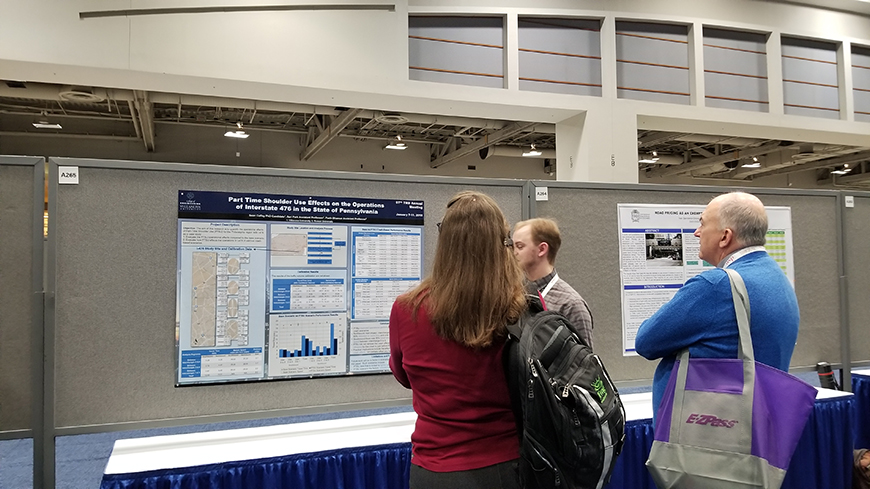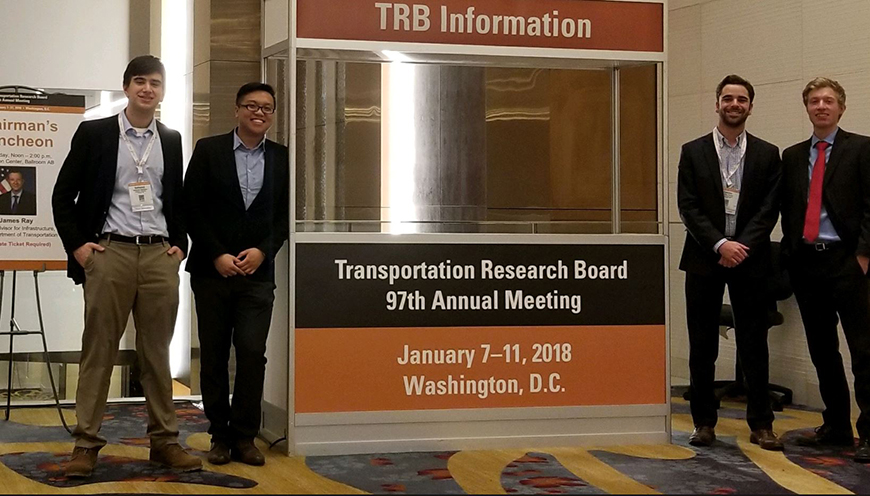PhD Student and Faculty Present Research at Transportation Engineering Conference

PhD student Sean Coffey presented research on the effectiveness of part-time shoulder use.
Each January, thousands of transportation engineering professionals gather in Washington, D.C. for the annual Transportation Research Board (TRB) conference—the most prestigious international conference in the transportation field. This year, Civil and Environmental Engineering Assistant Professor Seri Park, PhD, PTP, and Associate Professor Leslie McCarthy, PhD, PE were joined at the five-day meeting by four Villanova University undergraduate engineering students, as well as doctoral candidate Sean Coffey, who made a presentation based on his dissertation. Sponsored by the National Academies of Science, Engineering, and Medicine, each day of the event was filled with networking sessions, presentations and industry workshops that offered insight into helping improve the country’s infrastructure.
Drs. Park and McCarthy made three presentations on their research on the integration of roadway safety data. Theirs was one of more than 5,000 presentation proposals submitted, of which less than 1,000 were chosen. Dr. Park explains the goal of their research, “There is currently a disconnect between federal and state or local roadway safety data collection and maintenance processes, and that’s what we’re working to improve.” Reviewing the systems of those states that have already shown successful data integration from various sources, the research indicates that there are numerous benefits that come from adding local data to state databases in order to mainstream safety project selection and implementation. One of the presentations included a workshop aimed at training other professionals and a discussion on how to implement the processes. “It’s important to highlight success in certain areas and pass that on to others,” says Dr. Park.
Coffey presented his dissertation research on the effectiveness of part-time shoulder use (PTSU), which is a roadway operation improvement strategy that utilizes the shoulder as a temporary lane to relieve congestion. Sean has used Interstate 476 as a case study, analyzing multiple sites where PTSU could be implemented. “The part of my research that was presented at the TRB conference is about the effect of PTSU on the operational performance of I-476 in a variety of scenarios. In every situation, its use significantly improved performance,” he says. I-476 serves as a reliable case study due to very consistent traffic congestion, and Sean’s work aims to alleviate many of the major concerns that causes.

Civil and Environmental Engineering seniors Nathaniel Gallishaw, Andy Ye, Camden Palvino and David Harvey attended the TRB conference.
For the four undergraduate students who attended, the conference offered invaluable insight into the world of transportation engineering. Andy Ye, Camden Palvino, David Harvey, and Nathaniel Gallishaw, all senior civil engineering students, are currently working on a research project looking into the sustainable applications of reclaimed asphalt pavement (RAP). Their attendance at TRB allowed them to attend several sessions on the use of RAP for plastic pipe backfill—covering pipes once they are installed. Due to the abundance of RAP that is currently sent directly to landfills, showing that it has viable use as a backfill material would be a substantial reduction in cost. Additionally, the TRB meeting served as a networking opportunity unlike anything they had ever experienced. Nathaniel remarks, “It was a great opportunity to network with professionals by exchanging business cards, hearing more about their companies, and asking questions about their recent and current projects.” Furthermore, it highlighted the broad spectrum of disciplines that are practiced in transportation engineering. “There were sessions ranging from commercial spaceflight to designing retaining walls in salt mines thousands of feet below the earth. It was fascinating to see how much research goes into these projects and the innovation that results from it, as well as the seemingly limitless applications for engineering skills in this sector,” Camden explains.
